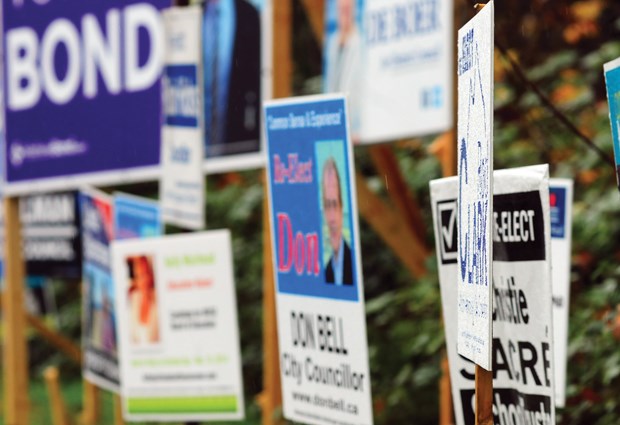Though the information won't be public for about another 80 days, it's a sure bet that local political candidates both raised and spent a lot of money in their recent election campaigns.
But the election just past will likely be the last one without spending limits or restrictions on who can contribute to local political campaigns or how much they can give, says Patrick Smith, a Simon Fraser University political professor.
Smith adds it's about time, because candidates can spend huge amounts of money in their bids for public office.
"Money plays quite a large role in B.C. local government elections," he said. "We're the worst example in all of Canada. There's no regulation of how much money is raised and how much is spent."
In the 2011 civic elections, candidates on the North Shore collectively spent over $333,000 on their campaigns, with City of North Vancouver Mayor Darrell Mussatto spending the most at over $51,000.
On the North Shore, donations from development corporations and civic employees' unions have frequently been pointed to as a source of possible concern, because local elected officials have direct power over their interests.
"Yes it is a problem," says Smith. "It is a problem of appearances and potential."
Smith said accepting those kinds of donations doesn't mean anything untoward is happening but, "The potential is there. The appearances are there. There's opportunities for quid pro quos and understandings."
"Is Montreal the only place this happens? It would be naive to think that."
Prior to the Nov. 15 civic election, B.C. introduced rules recommended by a provincial task force requiring greater disclosure from candidates and third-party advertisers. The province stopped short of limiting how much candidates can spend or receive in donations until after the election.
A legislative committee is currently examining the issue and is accepting public comment on general principles until Dec. 5. Neither District of North Vancouver Mayor Richard Walton or West Vancouver Mayor Michael Smith had to run an election campaign this time (both were acclaimed), but neither are strangers to the issues.
"I've been in politics for 17 years and I've never accepted campaign contributions from anybody," said Smith last month. "I just don't believe in it. I always fund it myself."
That way, "I don't have any conflicts," he said. "Nobody has an expectation."
But Walton said without campaign donations, only the wealthy could afford to run for public office. "If you have a strong challenger, it can cost well over $20,000," to run an election campaign in an urban area, he said. Without financial help, candidates end up paying for that out of their own retirement savings, he said.
Smith said it's necessary to have spending limits in campaigns, likely based on population. Approximately $2 per capita is reasonable for most jurisdictions, he said, and might end the multimillion-dollar efforts that now dominate the City of Vancouver elections.
Smith also supports rules requiring more immediate disclosure of campaign donations and spending and rules that capture donations made prior to formal "election periods" that he said are poorly defined in any case.



